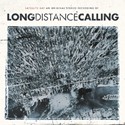
Long Distance Calling
Satellite Bay
Viva Hate Records
Say what you want about Damon Che and his drum set smashing, audience insulting, and ego maniacal arrogance, his band Don Caballero was on a mission to make lead vocalists irrelevant. The music teetered and swerved like a drunken pirate ship and left little room for a vocalist to gain any footing. Don Caballero’s success in that area speaks volumes to its creativity. A lot of bands feature solipsistic amateur poets who chew the musical scenery and devour their bands’ music whenever it approaches their vocals because they need the singer to drive home their point. Not every instrumental band is Don Caballero, and the voice is an element that makes the experience more intimate and memorable for the listener. Even a boring, repetitive vocal melody can have immediate and lasting resonance with the listener – ask Rihanna, el-ah-ay.
So why bands like Long Distance Calling exist is beyond me. Any time a band credits a member as playing “ambiance,” listener beware (anyway, with all the pounding drums and emotive guitars, very little ambiance can be heard). On the Satellite Bay press release, they defend the longevity of songs like “Jungfernflung” and “The Very Last Day,” both over 10 minutes, by saying “Music does not need to be divided into five-minute long chapters, verse-chorus-verse.” True, and no doubt some writer at their label probably wrote this statement, but the irony is that the surprise that should result from abandoning predictable song structure is absent. “Fire in the Mountain” might be 7:28, but it still riffs away in a loud-soft pattern where the guitars go from arpeggios to heavy strums, stomp boxes are engaged, and then it all swirls back down to a bland ending. That goes for just about every song on Satellite Bay, just in different keys at different speeds. Mr. Bungle, this is not.
At moments, Long Distance Calling recalls bands like June of 44 and other post-rockers, but almost every stone they encounter has already been turned. When they cite artists like Tool and God Speed You! Black Emperor, you’re left longing for the dynamics and passion of the former and wishing they tuned down the meandering of the latter. The only thing that keeps these songs from slipping fully into cliché is the absence of the one thing that could make them unique – a vocalist. On “Aurora,” when the echoing bass and drum pattern gives way to meandering guitars that get bowled over by a crunching riff, it feels like any other emo chorus in need of a vocalist to bring some purposeful drama.
Satellite Bay’s musical passages are well layered and executed, but they don’t justify their own existence beyond the band’s rehearsal space. Simply distending the noodley interplay of the indie-rock, post-punk sound pioneered by bands like Fugazi does not make it at all unconventional. If anything, it just highlights how un-inspired these canned riffs really have become. Bands like Sigur Ros make much better use of slow crescendos and bring real haunting melodies to their instrumental passages. The band Battles does a masterful job of inverting every rock expectation the listener brings, and rewards repeat listens to its albums. Satellite Bay, on the other hand, is a long distance call that isn’t worth answering, and if you do, don’t expect anything more than pleasant hold music.
Long Distance Calling: http://www.myspace.com/longdistancecalling












